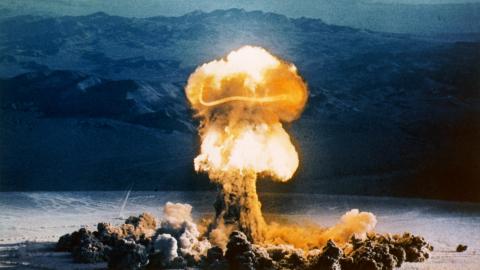President Trump ordered the Pentagon Thursday to “start testing our Nuclear Weapons on an equal basis.” He may mean conducting flight tests of delivery systems. Or he could mean explosive yield-producing tests, which the U.S. hasn’t conducted since 1992, when Washington and Moscow agreed to a moratorium.
In 2019, Lt. Gen. Robert Ashley, director of the Defense Intelligence Agency, told the Hudson Institute that “Russia probably is not adhering to the nuclear-testing moratorium in a manner consistent with the zero-yield standard.” China and Russia are investing heavily in their nuclear programs and also behaving aggressively toward their neighbors. China is dramatically expanding a sophisticated, diverse missile force. Russia is especially belligerent in its nuclear flight testing and brinkmanship. For the first time, the U.S. faces two major nuclear adversaries simultaneously. The president’s refusal to be cowed by threatening Russian nuclear behavior is welcome.
Whatever Mr. Trump means by “testing,” the U.S. should work urgently to improve and adapt its nuclear deterrent. To do this, Mr. Trump should let the last arms-control treaty between the U.S. and Russia—the New Strategic Arms Reduction Treaty, or New Start—expire in February.
Weeks ago Mr. Putin offered Mr. Trump an extension of New Start in a thinly veiled attempt to flatter Mr. Trump’s Nobel Peace Prize aspirations. Mr. Trump should reject the offer. New Start was negotiated by President Obama and extended by President Biden. Mr. Obama made a lopsided deal. To comply, the U.S. had to reduce its deployed strategic launchers by 25%, while Russia didn’t have to make any reductions.
When the treaty went into force, Defense Minister Anatoly Serdyukov said Russia would build up its forces to the treaty limits, and it has. The treaty also failed to curb Russia’s theater nuclear weapons, which outnumbered the North Atlantic Treaty Organization’s by 10 to 1. The Senate’s articles of ratification required follow-on treaties to include theater nuclear weapons reductions. There has been no progress on this front.
On Feb. 3, 2021, Mr. Biden agreed to extend the treaty for another five years. A year later, Russia invaded Ukraine and stopped complying with New Start’s critical on-site verification measures. This year, the State Department admitted that “Russia may have exceeded the deployed warhead limit by a small number during portions of 2024.”
Extending New Start would make it harder to deter Russia from using a nuclear weapon in Ukraine or attacking a NATO country conventionally. It would also undermine America’s ability to deter China, which has more than tripled its arsenal in the past five years and is increasingly collaborating with Moscow.
In August 2019, Mr. Trump withdrew from the Intermediate-Range Nuclear Forces Treaty, citing Russia’s noncompliance and China’s unchecked missile development. The same logic applies to New Start. The president’s advisers should be examining ways to maximize the options to deter both powers.
It would be prudent for Mr. Trump to insist that the U.S. fully modernize its nuclear triad. That will require an audit of the regulations around Sentinel, the program for replacing intercontinental ballistic missiles, and eliminating unnecessary and costly barriers to avoid more delays and cost overruns. He should also continue to support Columbia-class submarines and work with Congress to ensure the Ohio class can be extended immediately by reopening the launch tubes that were shuttered to comply with New Start.
The president should double the anticipated fleet of the next-generation stealth bomber, the B-21, recognizing that stealth technology is one of America’s clear qualitative advantages over China and that the dual-capable bomber will help reassure allies in Asia and Europe that are threatened by Beijing and Moscow. If China decides to invade Taiwan, Russia could see it as an opportunity to seize territory in Europe. The new bomber would decrease the odds of such opportunistic aggression.
The U.S. should also accelerate the deployment of the SLCM-N, a new sea-launched, nuclear-armed cruise missile, and put more warheads on ICBMs and submarine-launched systems. These steps would help keep the peace, which is a better prize than the Nobel.















